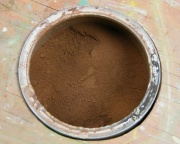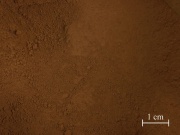Difference between revisions of "Burnt umber"
Jump to navigation
Jump to search
| (One intermediate revision by one other user not shown) | |||
| Line 3: | Line 3: | ||
A chocolate brown iron ore pigment made by roasting [[raw umber]]. Burnt umber contains [[iron%20oxide%20red|iron oxide]] and [[manganese dioxide]]. The heat treatment converts the yellowish [[ferric%20hydroxide|iron hydroxides]] to brownish iron oxides which produces a dark brown pigment with a reddish tone. Burnt umber is a permanent pigment that has been used in oil and watercolor paints. | A chocolate brown iron ore pigment made by roasting [[raw umber]]. Burnt umber contains [[iron%20oxide%20red|iron oxide]] and [[manganese dioxide]]. The heat treatment converts the yellowish [[ferric%20hydroxide|iron hydroxides]] to brownish iron oxides which produces a dark brown pigment with a reddish tone. Burnt umber is a permanent pigment that has been used in oil and watercolor paints. | ||
| − | |||
[[File:Burnt.umber.powder_det.jpg|thumb|Burnt umber]] | [[File:Burnt.umber.powder_det.jpg|thumb|Burnt umber]] | ||
| Line 10: | Line 9: | ||
Pigment Brown 7; CI 77492; terre d'ombre brûlée (Fr.); Gebrannte Umbra (Deut.); sombra tostada (Esp.); ombra psimenii (Gr.); terra d'ombra bruciata (It.); bruno di Roma (It.); bruine omber (Ned.); Caledonia brown; Cappagh brown; mineral brown; Turkey umber; jacaranda brown; chestnut brown; | Pigment Brown 7; CI 77492; terre d'ombre brûlée (Fr.); Gebrannte Umbra (Deut.); sombra tostada (Esp.); ombra psimenii (Gr.); terra d'ombra bruciata (It.); bruno di Roma (It.); bruine omber (Ned.); Caledonia brown; Cappagh brown; mineral brown; Turkey umber; jacaranda brown; chestnut brown; | ||
| + | == Risks == | ||
| + | |||
| + | * Toxic by ingestion. | ||
| + | * May cause manganese poisoning. | ||
| + | ==Physical and Chemical Properties== | ||
{| class="wikitable" | {| class="wikitable" | ||
|- | |- | ||
! scope="row"| Density | ! scope="row"| Density | ||
| − | | 3.64 | + | | 3.64 g/ml |
|- | |- | ||
! scope="row"| Refractive Index | ! scope="row"| Refractive Index | ||
| Line 19: | Line 23: | ||
|} | |} | ||
| − | == | + | ==Resources and Citations== |
| − | |||
| − | |||
| − | |||
| − | |||
* R. J. Gettens, G.L. Stout, ''Painting Materials, A Short Encyclopaedia'', Dover Publications, New York, 1966 Comment: density 3.64 and ref. index 2.2-2.3 | * R. J. Gettens, G.L. Stout, ''Painting Materials, A Short Encyclopaedia'', Dover Publications, New York, 1966 Comment: density 3.64 and ref. index 2.2-2.3 | ||
| Line 41: | Line 41: | ||
* ''The American Heritage Dictionary'' or ''Encarta'', via Microsoft Bookshelf 98, Microsoft Corp., 1998 | * ''The American Heritage Dictionary'' or ''Encarta'', via Microsoft Bookshelf 98, Microsoft Corp., 1998 | ||
| − | * Art and Architecture Thesaurus Online, | + | * Art and Architecture Thesaurus Online, https://www.getty.edu/research/tools/vocabulary/aat/, J. Paul Getty Trust, Los Angeles, 2000 |
[[Category:Materials database]] | [[Category:Materials database]] | ||
Latest revision as of 07:53, 11 May 2022
Description
A chocolate brown iron ore pigment made by roasting Raw umber. Burnt umber contains iron oxide and Manganese dioxide. The heat treatment converts the yellowish iron hydroxides to brownish iron oxides which produces a dark brown pigment with a reddish tone. Burnt umber is a permanent pigment that has been used in oil and watercolor paints.
Synonyms and Related Terms
Pigment Brown 7; CI 77492; terre d'ombre brûlée (Fr.); Gebrannte Umbra (Deut.); sombra tostada (Esp.); ombra psimenii (Gr.); terra d'ombra bruciata (It.); bruno di Roma (It.); bruine omber (Ned.); Caledonia brown; Cappagh brown; mineral brown; Turkey umber; jacaranda brown; chestnut brown;
Risks
- Toxic by ingestion.
- May cause manganese poisoning.
Physical and Chemical Properties
| Density | 3.64 g/ml |
|---|---|
| Refractive Index | 2.2 - 2.3 |
Resources and Citations
- R. J. Gettens, G.L. Stout, Painting Materials, A Short Encyclopaedia, Dover Publications, New York, 1966 Comment: density 3.64 and ref. index 2.2-2.3
- G.S.Brady, Materials Handbook, McGraw-Hill Book Co., New York, 1971 Comment: p. 558
- Michael McCann, Artist Beware, Watson-Guptill Publications, New York City, 1979
- R.D. Harley, Artists' Pigments c. 1600-1835, Butterworth Scientific, London, 1982
- Matt Roberts, Don Etherington, Bookbinding and the Conservation of Books: a Dictionary of Descriptive Terminology, U.S. Government Printing Office, Washington DC, 1982
- Dictionary of Building Preservation, Ward Bucher, ed., John Wiley & Sons, Inc., New York City, 1996
- Random House, Webster's Encyclopedic Unabridged Dictionary of the English Language, Grammercy Book, New York, 1997
- The American Heritage Dictionary or Encarta, via Microsoft Bookshelf 98, Microsoft Corp., 1998
- Art and Architecture Thesaurus Online, https://www.getty.edu/research/tools/vocabulary/aat/, J. Paul Getty Trust, Los Angeles, 2000

